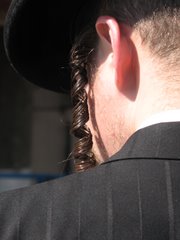A "mechitza" is a divider that separates the women from the men in Orthodox synagogues. How the separation is accomplished varies by synagogue and says something about how the congregation interacts with their female members.
Example A: Up and Away
Many older shuls (synagogues) were designed with balconies, so that women would sit overlooking the main sanctuary, containing the ark, the bimah (pulpit of sorts) and the men's seating area. While completely removed from the scene of the "action", the leading of prayers and the reading of the Torah, in this variation at least the women can see what is going on.
Example B: On (almost) the Same Plane
In some contemporary Orthodox shuls, the mechitza divides the central sanctuary, with women and men seated on either side, on the same plane. The height and material of the mechitza can range from a low permanent wooden barrier to a tall portable screen, or many variations in between. This version is a bit friendlier than Example A, although women are still not involved in reading the Torah.
Example C: Separate but Equal
I'm told that there is a synagogue in Jerusalem where the mechitza runs smack down the middle of the sanctuary AND continues through the middle of the bimah, allowing both women and men to read from the Torah without sharing the same physical space.
Example D: Out of Sight, Out of Earshot
And there is the "we don't want to see or hear you" mechitza, behind which I found myself on a recent Erev Shabbat. The mechitza itself was made of lace but the women's section was a small area behind the sanctuary, near one of the restrooms. Through the lace I could see the backs of heads but the height of the divider obstructed my view of the stained glass and colorful quilted curtain on the ark. Frustrated by my position at the rear, I sang my favorite Shabbat melodies as passionately as I could, which I really wasn't supposed to in this particular place. One of the handful of women in my section was, I think, trying to shush me. It didn't matter - I was quickly and easily drowned out, and I felt left out.
Walking back to the Ulpan from services, another American in my group commented that this synagogue had one of the most aggressive mechitzas (ok, it's really "mechitzot" in Hebrew) he's ever seen.
I certainly received the message that I was a persona non grata. I will not be returning.
Sunday, March 11, 2007
Subscribe to:
Post Comments (Atom)

No comments:
Post a Comment